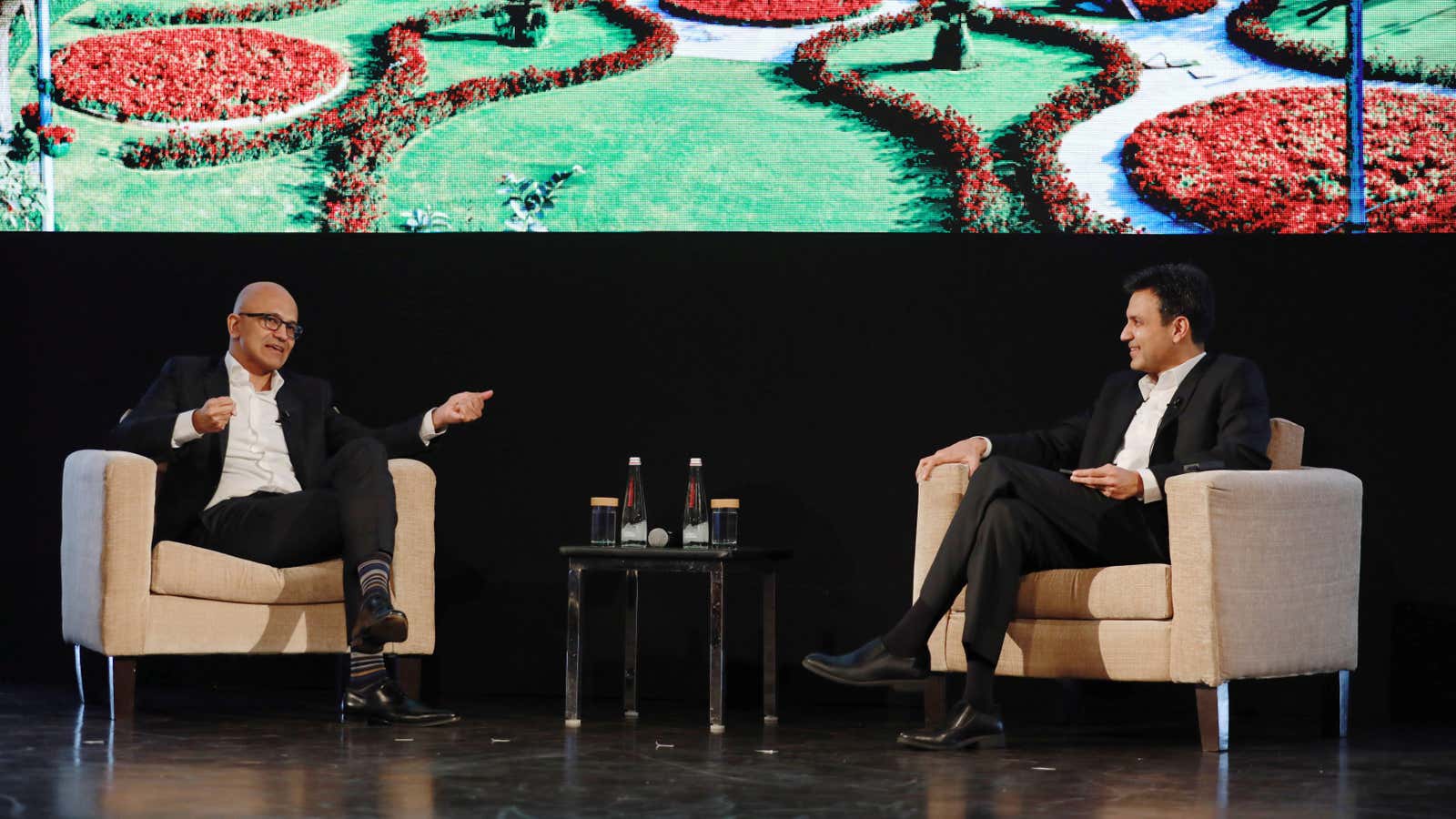Satya Nadella is in awe of the high-level of empathy that young Indians possess today. In fact, he believes, this empathy will go a long way in helping India churn out great innovations in the future.
“Empathy plays an important role in (the) development of some of the technology-led solutions,” Nadella said during a conversation with Microsoft India president Anant Maheshwari at the Young Innovators Summit held in New Delhi yesterday (Feb. 26).
Nadella’s comments were inspired by his meeting with a bunch of Indian school students in Delhi who showed him their projects that use artificial intelligence (AI) and machine learning (ML) to fight challenges related to air pollution and matching recipient and donor during organ donation, among other things.
The kids also reminded Nadella of his school days in Delhi, he said.
Below are edited excerpts from the conversation between Nadella and Maheshwari where the former talks cricket and the need to balance out the use of technology, among other things:
Did the interactions with students in Delhi bring back memories of your school days? What were they like?
Yes, watching the young innovators reminded me of my school days. I went to Bharatiya Vidya Bhavan, which is right here at Kasturba Gandhi Marg in Delhi. In those early days, everyone around me shaped my thinking. Then, growing up in Hyderabad, my world view was formed by my teachers.
What I remember now is that learning is all about focusing on the process rather than say concentrating on reaching the destination. Perhaps during the early days, I never listened to this advice as closely as I should have.
My mother and father are academically accomplished. They always encouraged me to follow and do whatever I was passionate about. My summer holidays were spent reading whatever I was passionate about. It is passion (and) curiosity that sustains you.
Earlier generations learned to use technology, Now, kids use technology to learn. How should students think about learning and technology today?
Today’s world has an abundance of devices and content. We need to ask, what does deep work look like? When was the last time we got lost in reading say our favourite Russian author? Educationists need to opine on that. We need more of a balance. There has to be a balance between what I would call consumption and creation.
At Microsoft we have this question: Are you a PowerPoint first or a Word first? You have to have a balance. Sometimes it is important to tell a story, and at times it is important to write down a task.
This is something that we try to do with Minecraft (Microsoft’s video game). The video game is to be enjoyed and can be leveraged effectively to learn programming.
Today, people do not have time to create something new. We are overdoing consumption. All of us have to have the time to create more things and technology should help us do that.
How prepared are young Indians to face global challenges like climate change?
During my trip to India, what excited and inspired me from my meetings with students is the quality of their ideas, the scope of their ambition, and their deep passion and deep empathy turning into action. This is how societies and economies move forward.
Young Indian students want to change things. This ambition and empathy is leading to the development of technology-led solutions to solve unique challenges for differently-abled people. Students have also developed technology solutions to fight pollution.
What is the one superpower you wish you had?
If I could read all the books that I have bought…I would so much be better off.
Cricket or coding?
Coding for cricket.
Just a day ago I met (former Indian cricketer) Anil Kumble. By education, he is an engineer, and now he has a startup, which puts an internet of things sensor on a bat (the sensor is backed by Microsoft technology). The sensor records the speed of a ball and the power of a shot. The data collected from the sensor can be used to analyse shot selection and speed.
Technology has a great role to play in healthcare. I met Devi Shetty of Narayana Health, who looks at health costs through technology. He is focused on bringing down health costs through the usage of technology. For this, he said that coding has to become an essential skill.
So, coding is like poetry, it inspires liberal arts.
Who is your favourite between Sachin Tendulkar and Virat Kohli?
This is like choosing between two religions. I would say Sachin yesterday, Virat today.
